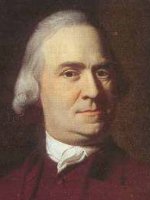 Among many other things, the Declaration of Independence complains that bad, bad George III has harmed his American subjects by “transporting us beyond seas, to be tried for pretended offenses.” The standard line is that this is a reference to the Administration of Justice Act, which Parliament passed in 1774.
Among many other things, the Declaration of Independence complains that bad, bad George III has harmed his American subjects by “transporting us beyond seas, to be tried for pretended offenses.” The standard line is that this is a reference to the Administration of Justice Act, which Parliament passed in 1774.However, when I looked at the wording of that law, I saw that it applied only to employees of the royal government. It said nothing about any other criminal defendants. So it wasn’t designed to deprive colonists of fair trials by moving them far from their homes. Instead, it was designed to give Crown employees fair trials by moving them away from supposedly prejudiced juries.
So where, I asked, did the “transporting us beyond seas” complaint come from? And I still had no idea until earlier this month, when at the American Antiquarian Society I came across the Concord town meeting’s instructions to its General Court representative, James Barrett. His fellow citizens identified this as a grave threat to their liberty:
...and whereas an act was Passed in the Last Sisson of the British Paliment Entitled an act for the Preserving his Majesties Dockyards Magazines Ships ammunition & Stores, by which act we in this Countrey are Exposed to the Rage of some Malicous Persons who out of Complasance to Some Court Sycophant may accuse any Person, and thereby Cause him to be hurried out of the Countrey and Carried to some Distant Place, from all his friends & acquaintance, and thereby Deprived of the advantage of his Common Charicter, to be judged by Strangers & Perhaps by Foraners (and whether Inocent or Guilty[)] is in Danger of being Ruined in Person & Estate, which we Look upon to be a great infringement of our Rights and Priviliges, and Contrary to the true Sence of Magna Charta and Spirit of LawA ha! There’s the worry about “transporting us beyond seas, to be tried for pretended offenses,” without the pithy language. One might ask why the farmers of Concord were worried about being tried for damaging dockyards and ships.
In fact, this complaint echoed one from Boston, which had a lot of dockyards and ships, as well as a reputation for hampering royal officials in their duties. In November 1772, Boston’s town meeting had objected to the same law. In a “List of Infringements” appended to an essay on “the Rights of the Colonists” drafted largely by Samuel Adams, the tenth item is “The Act passed in the last Session of the British Parliament, intitled, An Act for the better preserving his Majestys Dock Yards, Magizines, Ships, Ammunition and Stores”. The town complained:
By this Act any one of us may be taken from his Family, and carried to any part of Great Britain, there to be tried whenever it shall be pretended that he has been concerned in burning or otherwise destroying any Boat or Vessel, or any Materials for building &e. any Naval or Victualling Store &c. belonging to his Majesty.Other Massachusetts towns which, like Concord, mentioned this law in their instructions to elected representatives include Lancaster, Groton, Mendon, and Hingham.
For by this Act all Persons in the Realm, or in any of the places thereto belonging (under which denomination we know the Colonies are meant to be included) may be indicted and tryed either in any County or Shire within this Realm, in like manner and form as if the offence had been committed in said County, as his Majesty and his Successors may deem Most expedient.
Thus we are not only deprived of our grand right to tryal by our Peers in the Vicinity, but any Person suspected, or pretended to be suspected, may be hurried to Great Britain, to take his tryal in any County the King or his Successors shall please to direct; where, innocent or guiltv he is in great danger of being condemned; and whether condemned or acquitted he will probably be ruined by the expense attending the tryal, and his long absence from his Family and business; and we have the strongest reason to apprehend that we shall soon experience the fatal effects of this Act, as about the year 1769 the British Parliament passed Resolves for taking up a number of Persons in the Colonies and carrying them to Great Britain for tryal, pretending that they were authorised so to do, by a Statute passed in the reign of Henry the Eighth, in which they say the Colonies were included, although the Act was passed long before any Colonies were settled, or even in contemplation.
Now the next mystery is: Why did Adams and his fellow citizens think that “about the year 1769 the British Parliament passed Resolves for taking up a number of Persons in the Colonies and carrying them to Great Britain for tryal”?
TOMORROW: Why Rhode Islanders were especially alarmed by that new law.
The 1769 resolves of Parliament that Adams objected to were those approved by the House of Commons on 26 January 1769, suggesting that the 1543 Treason Act could be applied to Bostonians after the Townshend Acts protests. The 1543 Treason Act, passed during the reign of Henry VIII, allowed for acts of treason committed outside England to be tried within England. Edmund Burke and William Dowdeswell gave trenchant speeches against the 1769 resolutions, to no avail.
ReplyDeleteThank you! Last week I came across another reference to a parliamentary law of 1769 and told myself I should get back on that trail. Your comment is timely and helpful.
ReplyDelete